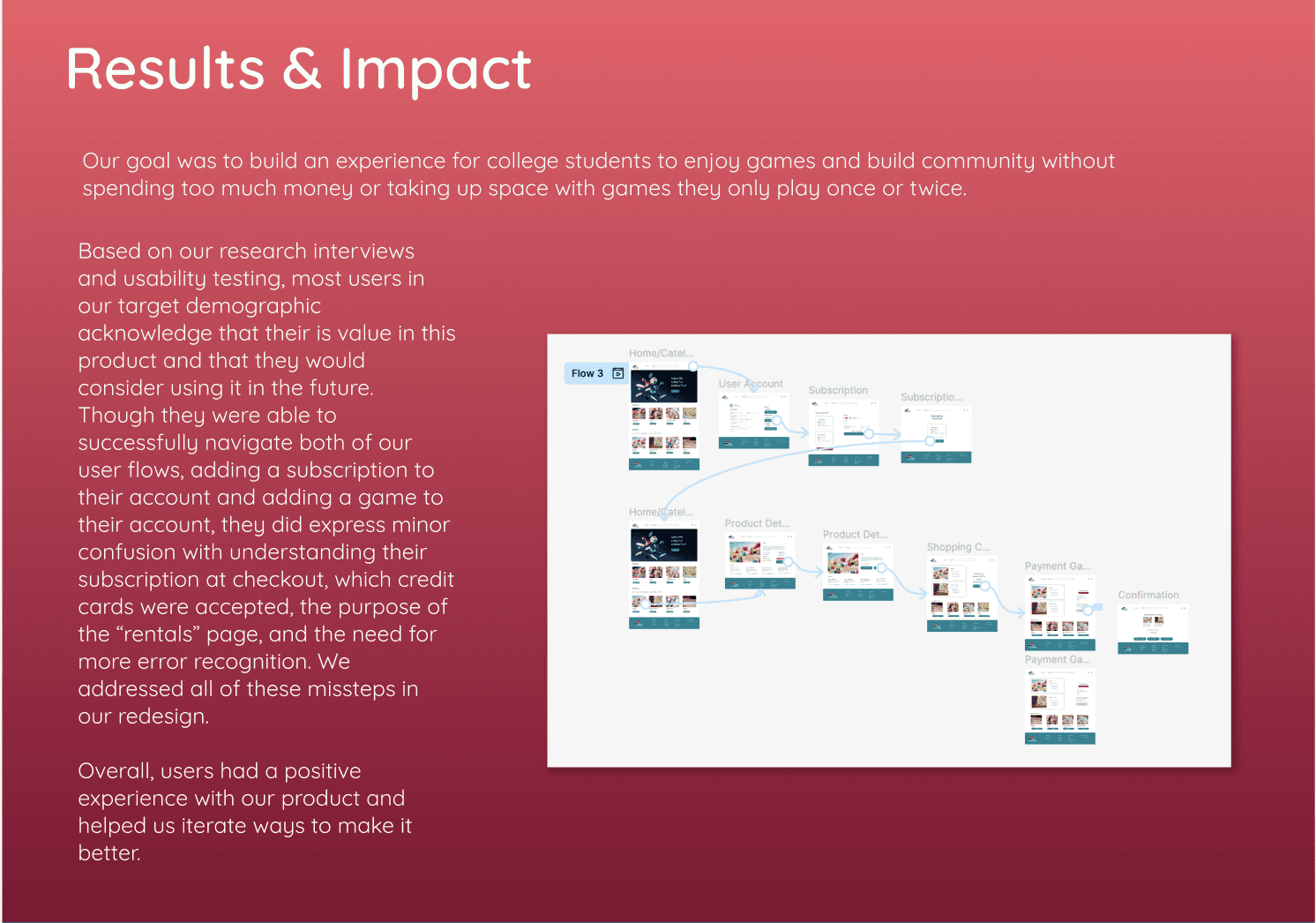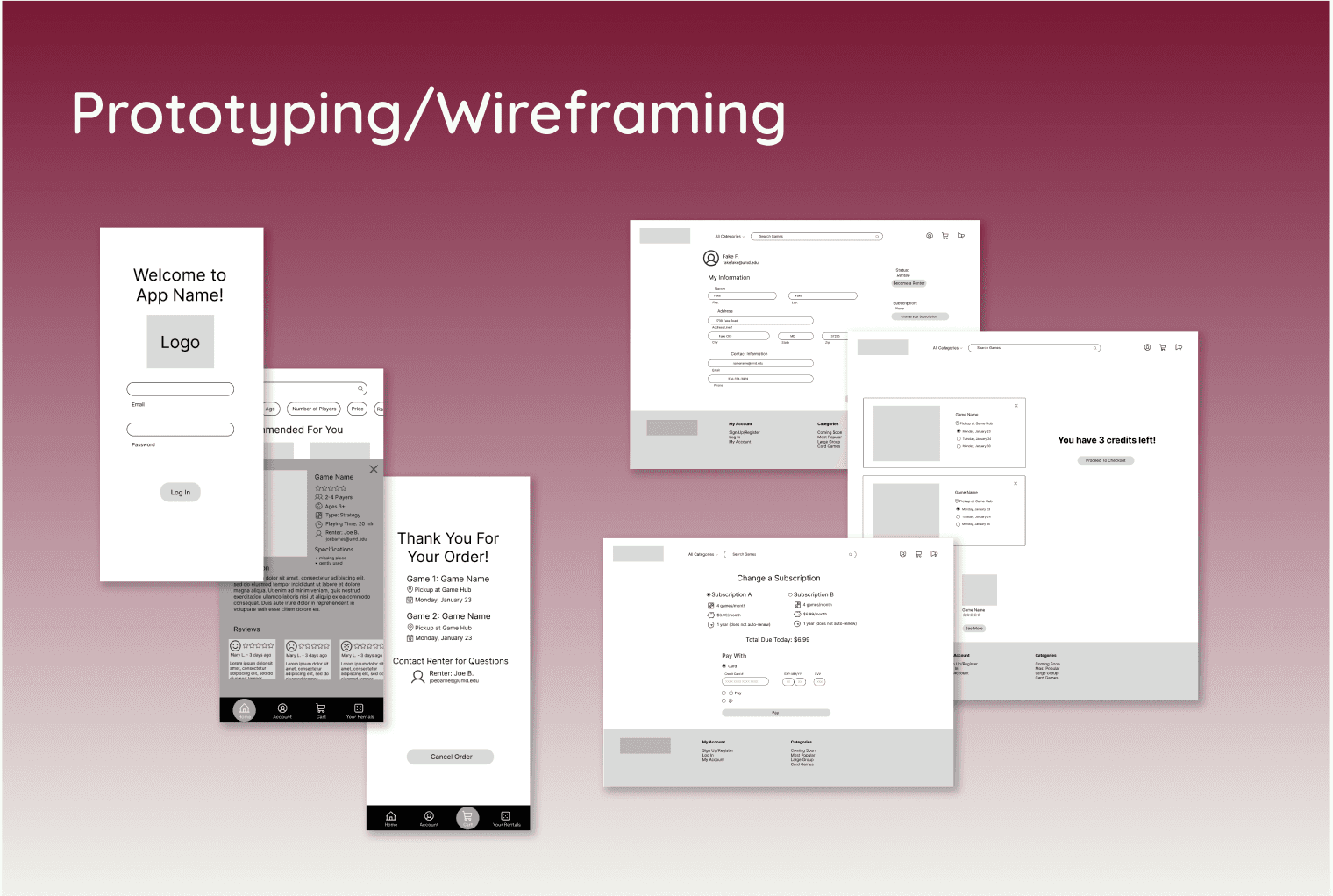Game Exchange
A board game rental e-commerce app tailored for young users aged 16–30.
Introduction
Board games continue to be a popular choice for social interaction, especially among young people looking for fun, engaging ways to connect with friends. However, buying board games can be costly and overwhelming due to the sheer number of choices and uncertainty around which games will be enjoyable or worth the investment. Our team set out to better understand the habits, motivations, and frustrations of board game buyers and players between the ages of 16 and 30. These insights led us to develop Game Exchange: a board game rental e-commerce app similar to Turo and Airbnb that helps users rent games affordably, discover new favorites, and connect through shared experiences without the commitment of buying.

Challenge
To kick things off, we set out to understand how young people engage with board games and why traditional purchasing models weren’t serving their needs. Through one-on-one interviews with four board game users aged 16–30, we uncovered patterns in behavior, preferences, and frustrations. Most participants were buying board games in-person from stores like Target, found them expensive, and were hesitant to commit without knowing if the game would be fun. Only one participant used e-commerce platforms to buy games, even though they all agreed it was convenient.
We lacked a massive user base, so we leaned into primary interviews, competitor analysis, and heuristic evaluation to inform our strategy. We also reviewed platforms like Target and Cardhaus to benchmark usability and study how modern e-commerce tools structured navigation and filters. This allowed us to identify exactly where the current systems fell short and where a rental model could provide real value.
Design Process
Working from real needs
Our first challenge was building something useful and intuitive from scratch, while staying rooted in the real pain points users shared. These included pricing concerns, indecision caused by too many options, and a desire for social-driven game recommendations. Every decision we made user flows, content hierarchy, features came from user insights. This meant prioritizing simplicity and emotional trust: filters based on moods, comments from other users, and suggestions personalized to what you and your friends enjoy.
Filtering the noise
One of the biggest pain points we uncovered was decision fatigue users were overwhelmed by the sheer number of games out there. To address this, we designed a clean, minimal browsing experience that allowed users to explore games by intent: “fun with friends,” “quick games,” “strategy-focused,” etc.
We implemented a recommendation engine concept that would eventually suggest titles based on past rentals and ratings, creating a feedback loop that made the platform smarter over time.
Establishing a design system
We built out a simple but modular design system from scratch cards, buttons, search elements, and layout grids. These components prioritized legibility, spacing, and clarity. We paid special attention to micro-interactions, such as hover states and rental confirmations, to ensure the interface felt responsive and welcoming.
Typography and hierarchy
We selected a modern, friendly typeface that could work across product listings, reviews, and navigation. The challenge here was balance our tone needed to be youthful and playful, but not childish. Through font pairing and size hierarchy, we established a rhythm that helped users quickly scan for what mattered most: the game title, how it was rated, and how long they could rent it.
Branding and polish
We crafted a warm, community-driven visual identity with soft shapes and rounded cards to mirror the idea of play. A custom logo was designed to reflect sharing, exchange, and connection. Our color palette was grounded in neutral backgrounds with pops of warm accent colors to draw attention to important actions like “Rent” or “Return.”
Every screen from the onboarding flow to the game detail view was polished with accessibility and delight in mind.
The result was Game Exchange, a concept mobile app that allows users to rent board games from each other, explore new games without long-term commitment, and engage with a social-driven discovery system. It solves key pain points around cost, indecision, and social trust while encouraging users to connect over games in a low-stakes, high-fun environment.
We believe Game Exchange reimagines how young people access board games not as consumers, but as a community of sharers and explorers.
Recommendations
Build features that highlight trusted reviews and trending games
Make onboarding fun and quick with personality/mood quizzes
Test rental system logistics in local campus communities
Add wishlist and “rent again” features for engagement

Takeaways
Designing Game Exchange showed us the power of combining affordability with community insights. By listening closely to our users, we realized they didn’t just need another place to buy they needed a way to explore, test, and share games socially and affordably. Our design centers around that experience.


